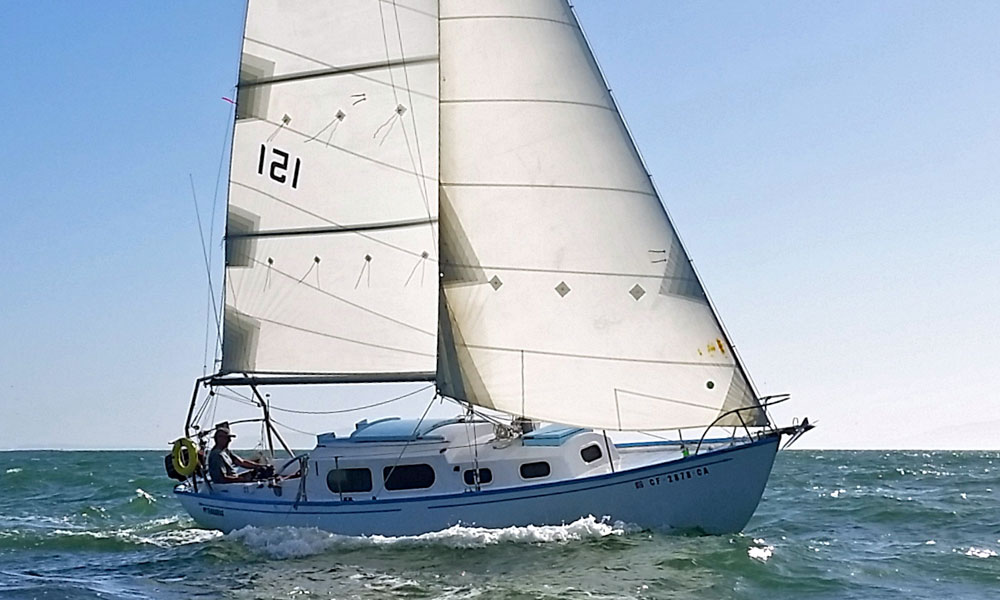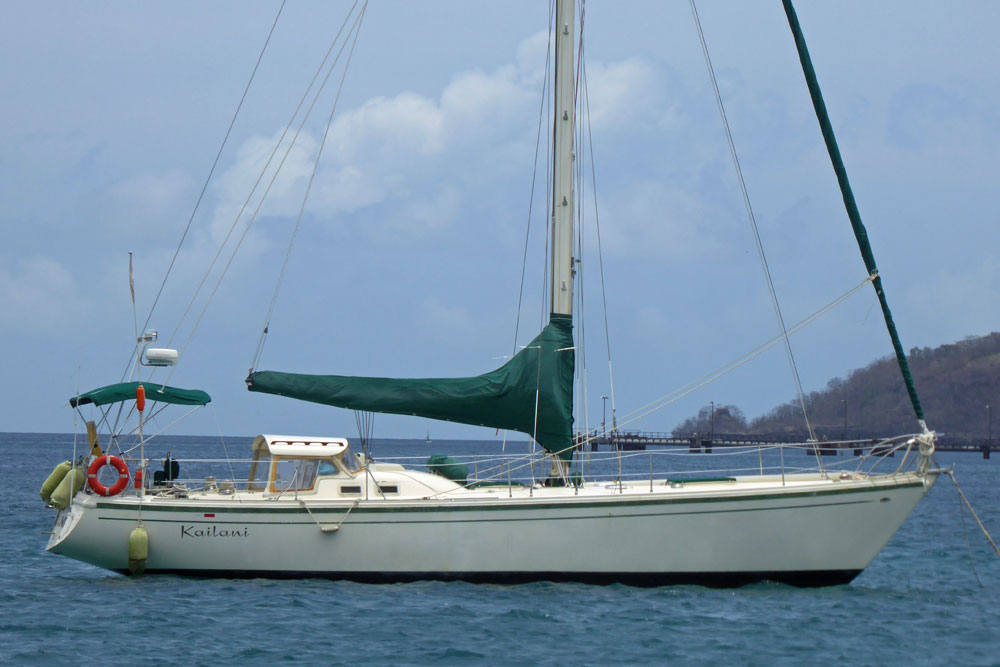- Home
- Cruiser Yachts under 30'
- Columbia 29
The Columbia 29 Sailboat
The Columbia 29 is a classic sailboat designed by the renowned naval architects Sparkman & Stephens and built by Columbia Yachts in the 1960s. It is a coastal cruiser with sleek lines, good performance, and reasonable comfort for its size. The boat has a long history and a loyal following among sailors who appreciate its quality and versatility.
Published Specification for the Columbia 29 MkI
Underwater Configuration: Long keel
Hull Material: GRP (fibreglass)
Length Overall: 28' 6" / 8.69m
Waterline Length: 22' 6" / 6.86m
Beam: 8' 0" / 2.44m
Draft: 4' 0" / 1.22m
Rig Type: Masthead Sloop
Displacement: 7,400lb / 3,357kg
Designer: Sparkman & Stephens
Builder: Columbia Yachts (USA)
Year First Built: 1961
Year Last Built: 1965
Owners Association: Columbia Yacht Owners Association
Published Design Ratios for the Columbia 29 MkI
1. Sail Area/Displacement Ratio: 16.4
2. Ballast/Displacement Ratio: 42
3. Displacement/Length Ratio: 290
4. Comfort Ratio: 29.5
5. Capsize Screening Formula: 1.6
A Few FAQs about the Columbia 29 MkI...
Based on the published design ratios for the Columbia 29, how is the boat likely to perform under sail?
Based on the published design ratios for the Columbia 29, how is the boat likely to perform under sail?
Based on these ratios, the Columbia 29 is a moderate weight sailboat that is slightly underpowered for its size. It is very stable and stiff, with an excellent righting capability if capsized. It is best suited for coastal cruising and moderate wind conditions.
Is the Columbia 29 still in production and, if not, when did production end and how many of these sailboats were built?
Is the Columbia 29 still in production and, if not, when did production end and how many of these sailboats were built?
The Columbia 29 is not in production anymore. Production ended in 1969, after eight years of manufacturing. A total of 687 hulls were built, including both the original MkI version and the later MkII version.
What, if any, alternative versions of the Columbia 29 were built and what are the differences between them?
What, if any, alternative versions of the Columbia 29 were built and what are the differences between them?
There were two main versions of the Columbia 29: the MkI and the MkII. The MkI was introduced in 1961 and had a traditional trunk cabin with a one-piece fibreglass headliner. The MkII was introduced in 1967 and had a redesigned trunk cabin to match the rest of the Columbia line of sailboats. The MkII also had a slightly increased ballast and displacement. Both versions shared the same hull, rig, and sail plan.
How many people can sleep on board a Columbia 29?
How many people can sleep on board a Columbia 29?
According to the sales material of the time, the Columbia 29 can sleep six people at a pinch, having two quarter berths, a forepeak double, and a convertible dinette. However, most owners would agree that four people is a more realistic number for comfortable sleeping arrangements.
How did the sailing press review the Columbia 29?
How did the sailing press review the Columbia 29?
The sailing press generally gave positive reviews to the Columbia 29, praising its design, construction, performance, and value. For example, Sail magazine wrote in 1970: "The Columbia 29 is one of those boats that has everything going for it -- good looks, good sailing characteristics, good accommodations -- and sells for a reasonable price."
What is the history of the builders of the Columbia 29 and is the company still in business?
What is the history of the builders of the Columbia 29 and is the company still in business?
The builders of the Columbia 29 were originally known as Glas Laminates Company, which was founded in California in 1958 by Dick Valdes and Bill Tripp Jr. The company started out by producing fibreglass camper tops, shower stalls, and chemical toilets. In 1961, they decided to enter the sailboat market with their first boat, the Columbia 29. The boat was so successful that they formed Columbia Yachts Corporation and adopted the Columbia name for their entire line of subsequent boats. By 1967, Columbia Yachts became the highest volume producer of fiberglass yachts in America.
However, in the early 1970s, the company faced financial difficulties due to increased competition from other builders, rising costs of materials and labor, and changing consumer preferences. In 1975, Columbia Yachts filed for bankruptcy and ceased operations. The company was briefly revived in 1978 by Howard Hughes' Summa Corporation but soon went out of business again.
Today, there is no active company that produces or sells new Columbia sailboats. However, there are several websites and online forums dedicated to preserving the legacy of Columbia Yachts and providing support and information to current owners.
What sailplan and rig options, if any, are available for the Columbia 29?
What sailplan and rig options, if any, are available for the Columbia 29?
The Columbia 29 has a standard sloop rig, with a single mast and a single headsail. The reported sail area is 382 square feet, divided between a mainsail and a genoa or jib. Some owners have also added a spinnaker or a gennaker for downwind sailing. The mast height is about 36 feet above the waterline.
What keel options, if any, are available for the Columbia 29?
What keel options, if any, are available for the Columbia 29?
The Columbia 29 has a long keel with a cutaway forefoot and an attached rudder. The draft of the keel is four feet. There are no other keel options available for the Columbia 29.
What is the average asking price of a secondhand Columbia 29?
What is the average asking price of a secondhand Columbia 29?
The average asking price of a secondhand Columbia 29 varies depending on the condition, location, and equipment of the boat. According to some online listings, the price range can be from $5,000 to $15,000.
How does the Columbia 29 compare to other similar sailboats in its class?
How does the Columbia 29 compare to other similar sailboats in its class?
The Columbia 29 is comparable to other classic sailboats of its era, such as the Pearson Triton, the Alberg 30, the Cal 28, or the Bristol 27. All these boats share similar characteristics, such as moderate size, long keels, sloop rigs, and coastal cruising capabilities. However, each boat also has its own strengths and weaknesses, depending on the design, construction, performance, and comfort factors.
- For example, the Pearson Triton is lighter and faster than the Columbia 29, but also less stable and spacious.
- The Alberg 30 is heavier and sturdier than the Columbia 29, but also slower and harder to maneuver.
- The Cal 28 is more modern and spacious than the Columbia 29, but also less seaworthy and classic.
- The Bristol 27 is more elegant and refined than the Columbia 29, but also more expensive and rare.
Ultimately, the choice of sailboat depends on the personal preferences and needs of each sailor. The Columbia 29 is a good option for those who value quality, versatility, and history in their sailboats.
What other sailboats have been created by the designer of the Columbia 29?
What other sailboats have been created by the designer of the Columbia 29?
The designer of the Columbia 29 was Sparkman & Stephens, one of the most prestigious and influential naval architecture firms in the world. Founded in 1929 by Olin Stephens and Drake Sparkman, Sparkman & Stephens has designed hundreds of sailboats for racing, cruising, and military purposes. Some of their most famous creations include:
- Dorade: A 52-foot yawl that won several transatlantic races in the 1930s and set a new standard for ocean racing yachts.
- Stormy Weather: A 54-foot yawl that won several Bermuda races in the late 1930s and early 1940s and was considered one of the most beautiful yachts ever built.
- Finisterre: A 38-foot centerboard yawl that won three consecutive Bermuda races in the 1950s and revolutionized offshore cruising design.
- Intrepid: A 12-meter class yacht that won two America's Cup races in 1967 and 1970 and introduced innovations such as a separate rudder and skeg.
- Freedom: A series of innovative yachts that featured unstayed masts and wishbone booms in various sizes and configurations.
- S&S Swan: A series of high-performance cruising yachts built by Nautor's Swan in Finland since the late 1960s.
The above answers were drafted by sailboat-cruising.com using GPT-4 (OpenAI’s large-scale language-generation model) as a research assistant to develop source material; to the best of our knowledge, we believe them to be accurate.
Other sailboats in the Columbia range include:
Recent Articles
-
Gulfstar Hirsch 45 Review: Specs, Performance & Buyer's Guide
Mar 02, 26 03:44 PM
An expert review of the Gulfstar Hirsch 45 sailboat. We analyse performance ratios, construction quality, and what to look for when buying this classic blue-water cruiser. -
Jeanneau Voyage 12.50 Review: Blue-Water Performance & Buyer's Guide
Mar 01, 26 06:05 PM
A detailed review of the Jeanneau Voyage 12.50 sailboat. Discover technical specs, performance ratios, and a buyer's checklist for common problem areas. -
CSY 44 Sailboat: Comprehensive Review, Specs & Performance Analysis
Feb 22, 26 10:41 AM
An in-depth review of the CSY 44 sailboat. Discover technical specifications, design ratios, and why this heavy-displacement cruiser remains a top choice for ocean voyagers.

